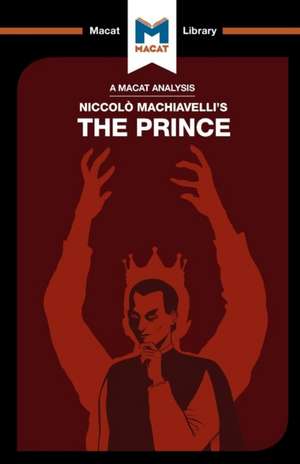An Analysis of Niccolo Machiavelli's The Prince: The Macat Library
Autor Riley Quinn, Ben Worthyen Limba Engleză Paperback – 15 iul 2017
Many of Machiavelli’s contemporaries thought that God would make sure morality was rewarded. To these people, it was inevitable that ethical individuals would enjoy success in this world and attain paradise in the next. Machiavelli was not so sure. He used the evidence of history to prove that people who can lie, cheat and murder tend to succeed.
Machiavelli concluded that three main factors affect a political leader’s success or failure. In doing so, he reached an entirely new understanding of the meaning of his evidence. Machiavelli argued that behaving in a moral way actually hinders a ruler. If everyone acted morally, he reasoned, then morals would not be a disadvantage. But in a world in which leaders are willing to be ruthless, a moral leader would make both themselves and their state vulnerable. Machiavelli’s novel interpretation posits that morals can make a leader hesitate, and this could cost them – and the citizens they are responsible for – everything.
Din seria The Macat Library
-
 Preț: 47.29 lei
Preț: 47.29 lei -
 Preț: 47.49 lei
Preț: 47.49 lei -
 Preț: 47.18 lei
Preț: 47.18 lei -
 Preț: 49.34 lei
Preț: 49.34 lei -
 Preț: 47.42 lei
Preț: 47.42 lei -
 Preț: 47.20 lei
Preț: 47.20 lei -
 Preț: 46.98 lei
Preț: 46.98 lei -
 Preț: 47.37 lei
Preț: 47.37 lei -
 Preț: 47.29 lei
Preț: 47.29 lei -
 Preț: 47.30 lei
Preț: 47.30 lei -
 Preț: 47.23 lei
Preț: 47.23 lei -
 Preț: 64.07 lei
Preț: 64.07 lei -
 Preț: 47.30 lei
Preț: 47.30 lei -
 Preț: 47.23 lei
Preț: 47.23 lei -
 Preț: 47.18 lei
Preț: 47.18 lei - 30%
 Preț: 32.99 lei
Preț: 32.99 lei -
 Preț: 47.13 lei
Preț: 47.13 lei -
 Preț: 47.23 lei
Preț: 47.23 lei -
 Preț: 47.65 lei
Preț: 47.65 lei -
 Preț: 47.37 lei
Preț: 47.37 lei -
 Preț: 47.08 lei
Preț: 47.08 lei -
 Preț: 47.18 lei
Preț: 47.18 lei -
 Preț: 47.18 lei
Preț: 47.18 lei -
 Preț: 47.13 lei
Preț: 47.13 lei -
 Preț: 47.99 lei
Preț: 47.99 lei -
 Preț: 47.23 lei
Preț: 47.23 lei -
 Preț: 47.02 lei
Preț: 47.02 lei -
 Preț: 47.23 lei
Preț: 47.23 lei -
 Preț: 47.42 lei
Preț: 47.42 lei -
 Preț: 47.30 lei
Preț: 47.30 lei -
 Preț: 47.13 lei
Preț: 47.13 lei -
 Preț: 47.10 lei
Preț: 47.10 lei -
 Preț: 47.20 lei
Preț: 47.20 lei -
 Preț: 46.98 lei
Preț: 46.98 lei -
 Preț: 47.18 lei
Preț: 47.18 lei -
 Preț: 47.30 lei
Preț: 47.30 lei -
 Preț: 47.15 lei
Preț: 47.15 lei -
 Preț: 47.29 lei
Preț: 47.29 lei -
 Preț: 64.24 lei
Preț: 64.24 lei -
 Preț: 46.98 lei
Preț: 46.98 lei -
 Preț: 47.40 lei
Preț: 47.40 lei -
 Preț: 47.87 lei
Preț: 47.87 lei -
 Preț: 47.42 lei
Preț: 47.42 lei -
 Preț: 47.33 lei
Preț: 47.33 lei -
 Preț: 47.40 lei
Preț: 47.40 lei -
 Preț: 47.40 lei
Preț: 47.40 lei -
 Preț: 46.98 lei
Preț: 46.98 lei -
 Preț: 47.20 lei
Preț: 47.20 lei -
 Preț: 47.21 lei
Preț: 47.21 lei
Preț: 47.26 lei
Nou
Puncte Express: 71
Preț estimativ în valută:
9.04€ • 9.42$ • 7.49£
9.04€ • 9.42$ • 7.49£
Carte disponibilă
Livrare economică 13-27 martie
Livrare express 26 februarie-04 martie pentru 14.78 lei
Preluare comenzi: 021 569.72.76
Specificații
ISBN-13: 9781912127610
ISBN-10: 191212761X
Pagini: 100
Dimensiuni: 129 x 198 x 7 mm
Greutate: 0.12 kg
Ediția:1
Editura: Macat Library
Colecția Macat Library
Seria The Macat Library
ISBN-10: 191212761X
Pagini: 100
Dimensiuni: 129 x 198 x 7 mm
Greutate: 0.12 kg
Ediția:1
Editura: Macat Library
Colecția Macat Library
Seria The Macat Library
Cuprins
Ways in to the Text Who was Machiavelli? What does The Prince Say? Why does The Prince Matter? Section 1: Influences Module 1: The Author and the Historical Context Module 2: Academic Context Module 3: The Problem Module 4: The Author's Contribution Section 2: Ideas Module 5: Main Ideas Module 6: Secondary Ideas Module 7: Achievement Module 8: Place in the Author's Work Section 3: Impact Module 9: The First Responses Module 10: The Evolving Debate Module 11: Impact and Influence Today Module 12: Where Next? Glossary of Terms People Mentioned in the Text Works Cited
Notă biografică
Riley Quinn holds master’s degrees in politics and international relations from both LSE and the University of Oxford.
Dr Ben Worthy is Lecturer in Politics at Birkbeck, University of London. His research interests include government transparency, open data and political leadership, and he is the author of The Politics of Freedom of Information: How and Why Governments Pass Laws That Threaten Their Power.
Dr Ben Worthy is Lecturer in Politics at Birkbeck, University of London. His research interests include government transparency, open data and political leadership, and he is the author of The Politics of Freedom of Information: How and Why Governments Pass Laws That Threaten Their Power.
Descriere
Though written more than 500 years ago, Niccolò Machiavelli’s The Prince is still both widely read and very influential. Readers turn to it for its direct advice on the question of how to attain — and retain — power.
